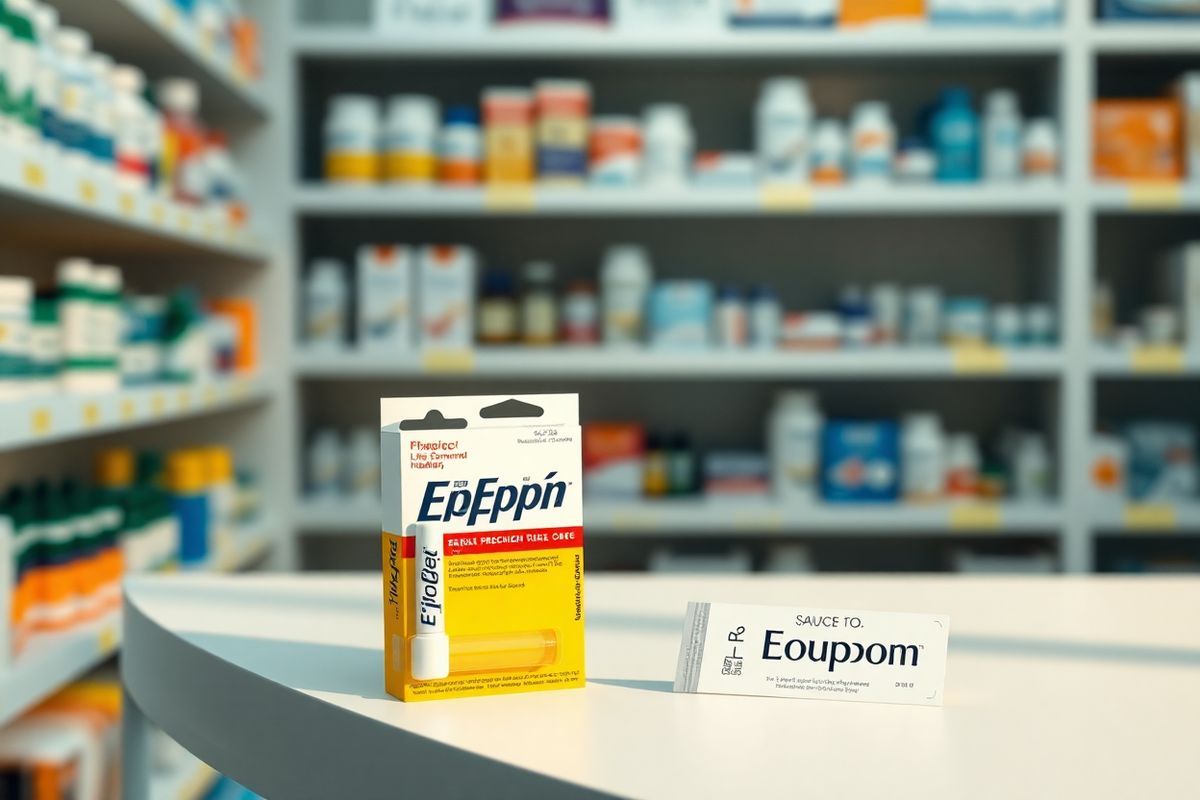Table of Contents
Understanding the EpiPen Cost Landscape: What You Need to Know

The retail price of an EpiPen in the United States varies significantly, especially when considering factors such as insurance coverage and pharmacy pricing. As of 2024, the price for a two-pack of EpiPens ranges from approximately $550 to $700 without insurance (Medical News Today, n.d.). This hefty price tag places a substantial financial burden on families who rely on these life-saving medications.
The EpiPen is a brand-name device that administers epinephrine, a critical hormone for treating severe allergic reactions known as anaphylaxis. Anaphylaxis can occur rapidly and can be triggered by various allergens, including certain foods, medications, and insect stings. The auto-injector allows individuals to self-administer the drug during emergencies, which is vital for survival (Abrams et al., 2024).
Several factors influence the cost of EpiPens, including location, pharmacy pricing, and the specific insurance plan an individual may have. For uninsured individuals or those with high-deductible plans, the out-of-pocket expenses can be prohibitive. Furthermore, the pricing structure can fluctuate based on manufacturer adjustments and market dynamics.
Medicare coverage is another critical aspect of the EpiPen cost landscape. Many Medicare drug plans cover generic epinephrine auto-injectors, and some may also cover EpiPen. However, the extent of coverage will depend on the specifics of each plan (Medical News Today, n.d.). Understanding these details can help seniors make informed decisions regarding their health care options.
Exploring Generic Epinephrine: A Cost-Effective Alternative
Generic versions of epinephrine auto-injectors provide a more affordable option for those needing treatment for anaphylaxis. Typically, these generics can be acquired at a fraction of the cost of the branded EpiPen, making them an attractive alternative for many consumers. The retail price for a two-pack of generic epinephrine is approximately half that of the branded option, offering substantial cost savings for individuals and families managing allergies (Medical News Today, n.d.).
Generic epinephrine auto-injectors are chemically identical to EpiPen and are manufactured to the same stringent standards set by the FDA. This means that patients can expect the same efficacy and safety from these products. Despite the cost difference, some consumers may be hesitant to switch due to brand loyalty or lack of knowledge about the generics available. It is essential for healthcare providers to educate patients about the availability and benefits of these alternatives, ensuring that cost does not hinder access to life-saving medications.
In light of recent legislation aimed at capping the price of EpiPens, specifically in New York where a bill has passed to cap the cost of a two-pack at $100 starting January 1, 2026 (Food Allergy Research and Education, 2024), consumers may also find their purchasing options expanding as manufacturers and pharmacies adapt to the new market conditions.
How to Access Coupons and Discounts for EpiPen Purchases

For those who may not qualify for Medicare or who have insurance plans that do not cover EpiPens adequately, accessing coupons and discounts can provide significant relief. Multiple platforms and organizations offer savings cards or coupons to help reduce the cost of EpiPens.
One of the key players in this space is Mylan, the manufacturer of EpiPen. Although Mylan has restrictions on their savings card eligibility for Medicare recipients, those with private insurance or no insurance may benefit from the company’s assistance programs (Medical News Today, n.d.).
Patients can often find coupons through various online resources, including manufacturer websites, health care providers, and pharmacy discount programs. Additionally, some non-profit organizations dedicated to allergy awareness and advocacy may provide information on available discounts and how to apply for them.
It is advisable for consumers to regularly check for updated coupon offerings, as these can change over time. Utilizing a combination of coupons, manufacturer assistance programs, and the availability of generics can help alleviate the financial burden associated with purchasing EpiPens.
Medicare Coverage for EpiPen: What Seniors Should Understand
Understanding how Medicare covers EpiPens is crucial for seniors managing severe allergies. Medicare Part D, which covers prescription drugs, generally provides coverage for epinephrine auto-injectors. However, the specifics of coverage can vary significantly depending on the individual’s Medicare plan (Medical News Today, n.d.).
For seniors enrolled in Medicare, it is important to review their Part D plan formulary to see if EpiPen is included and under what tier it falls. Drugs are typically categorized into tiers, with higher tiers often resulting in higher out-of-pocket costs for the patient. Moreover, Part C (Medicare Advantage) plans may also offer drug coverage, potentially providing additional options for accessing EpiPens at a lower cost.
The out-of-pocket costs associated with Medicare coverage can include deductibles, copayments, and coinsurance, which can add up quickly. Seniors should also be aware that while Medicare Part A and Part B may cover EpiPen injections administered in a hospital or outpatient setting, they do not cover the cost of EpiPens used at home (Medical News Today, n.d.).
To maximize savings, seniors are encouraged to explore all available options, including assistance programs and discount cards, which may further reduce the financial burden of purchasing EpiPens.
Navigating Financial Assistance Programs for EpiPen Users
Various financial assistance programs exist to support individuals and families struggling with the costs associated with EpiPen purchases. These programs can be particularly helpful for those who are uninsured or underinsured.
Some prominent organizations, including FARE (Food Allergy Research and Education), offer resources and assistance for individuals and families affected by food allergies. These organizations may provide information on local resources, grants, and scholarships aimed at reducing the financial burden of purchasing life-saving medications (Food Allergy Research and Education, 2024).
Additionally, some pharmaceutical companies offer assistance programs that provide free or reduced-cost medications to eligible patients. These programs typically require an application process, and eligibility may depend on income levels or specific criteria defined by the manufacturer.
For individuals with limited income, the “Medicare Extra Help” program can assist with prescription drug costs, ensuring that those who are eligible can access necessary medications without incurring significant financial strain (Medical News Today, n.d.).
In summary, navigating the financial landscape surrounding EpiPen purchases involves understanding the available resources, whether through Medicare, assistance programs, or discount offerings.
FAQ
What is an EpiPen used for?
An EpiPen is used to treat severe allergic reactions (anaphylaxis) by delivering a dose of epinephrine, which helps to reverse the symptoms of anaphylaxis.
How much does an EpiPen cost without insurance?
The retail cost for a two-pack of EpiPen typically ranges from $550 to $700 without insurance.
Are there generic alternatives to EpiPen?
Yes, there are generic epinephrine auto-injectors available that are significantly cheaper than the branded EpiPen.
Can I use coupons to buy EpiPens?
Yes, many organizations and manufacturers offer coupons that can help reduce the cost of EpiPens.
Does Medicare cover EpiPens?
Medicare Part D may cover EpiPens, but the extent of coverage varies by individual plans. It is essential to check the specific formulary of your plan.
What financial assistance is available for EpiPen users?
Various financial assistance programs exist, including those offered by non-profit organizations and pharmaceutical companies that provide free or reduced-cost medications to eligible patients.
References
- Abrams, E. M., Alqurashi, W., Fischer, D. A., Vander Leek, T. K., & Ellis, A. K. (2024). Anaphylaxis. Allergy, Asthma & Clinical Immunology, 20(Suppl 03). https://doi.org/10.1186/s13223-024-00926-3
- Food Allergy Research and Education. (2024). EpiPen price cap bill passes New York Legislature – EpiPens to cost $100. https://www.foodallergy.org/media-room/epipen-price-cap-bill-passes-new-york-legislature-epipens-cost-100
- Medical News Today. (n.d.). Medicare and EpiPen: Coverage, availability, and costs. https://www.medicalnewstoday.com/articles/does-medicare-cover-epipen










